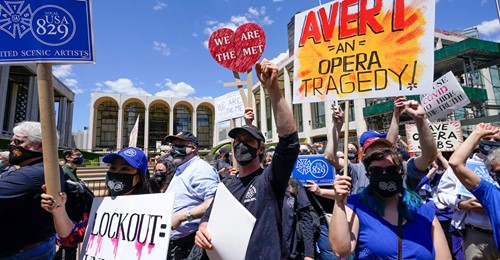Revealed: How the Met gobbles up most in US foundation grants
NewsFrom Joseph Horowitz’s review of a new history of the Ford and Rockefeller foundations and the NEA:
Amid the mountain of statistics Uy has culled, notably impressive is the “Top Ten Foundation Recipients in Music, 2006-2015.” The Metropolitan Opera placed first, with $176.3 million from 2,059 grants. The Metropolitan Opera Association placed third, with $88.4 million from 1,327 grants. (The New York Philharmonic, by comparison, landed $67.6 million from 1,380 grants.) “One cannot emphasize enough,” Uy says, “the magnitudes of disparity. The Metropolitan Opera alone received more than six times what went to all folk and indigenous music groups combined.”
The rich get richer, at the expense of the poor.

Full review here.





What is the distinction between what the Metropolitan Opera Association got and what the Metropolitan Opera got? Something does not make sense!
The “Metropolitan Opera Association, Inc.” is the legal name of the organization. They do business as “The Metropolitan Opera.”
Many nonprofits have different legal names. The Cleveland Orchestra, for example, is really “The Musical Arts Association.”
It’s a very interesting article.
I’d argue foundations made a major mistake trying to guide programmatic work of arts institutions through their funding, e.g. the “Magic of Music” program, because it never leads to something that’s sustainable. If you offer an orchestra a big grant to do something experimental, of course they’ll do it…so long as the foundation is providing support. As soon as the funding ends, so does the programming. As a funder, you can’t use your money to force innovation — that has to happen internally. The will needs to be there from both the organization and its audience.
It would have been far more helpful if foundation support went to helping arts organizations improve “infrastructure” to make them more financially stable, such providing funds to be used for diversifying and growing their fundraising so that they aren’t so dependent on a handful of major funders (arts organizations are really the worst when it comes to fundraising in the nonprofit sector — so many nonprofits have been seeing record donations in the last several years, except arts organizations)..
And of course, foundations shouldn’t be funding behemoth organizations because they can make a much bigger impact through primarily supporting smaller ones. For instance, a $1 million donation to the Met covers 0.3 percent of its budget; $1 million to a nascent organization with a $500k budget is transformative.
Monsoon: “For instance, a $1 million donation to the Met covers 0.3 percent of its budget; $1 million to a nascent organization with a $500k budget is transformative.”
Exactly the point that needed more emphasis. And before all the MAGA- heads who read this asphyxiate themselves while clutching their nooses made of pearls, there needs to be some kind of mechanism that can distribute some of these funds, in an equitable way, to those groups that are very deserving but whose muscle and clout doesn’t approach that of the Met.
Rabid red-hatters will invariably focus on the “folk and indigenous music groups” statement because their Orange-one induced soma manifests itself as loss of brain function. I’m sure someone will invoke Lenin any second now.
Ah, this is the magic of Peter Gelb. Saddened.
Of course the Met gobbles up money. Its production and fixed costs are large. Donors write checks for the prestige and perceived quality they are getting.
Comparing the financial needs of the Met and major symphony orchestras to those of “folk and indigenous groups” is like comparing the needs of the New York Yankees to those of the Amarillo Sod Poodles.
You’re comparing apples and oranges, as far as the relative size of annual budgets.
Please cease with your transatlantic finger-wagging at the Met, lest we start with the ROH.
It’s a bore.
What is an indigenous group?
Perhaps a typo? Rather, they intended “indignant”?
How about inane, as in “the inane red-hatters and their tired and inane attempts at ridicule”?